Boaty McBoatface? And you wonder why politicians don't want to hear your opinion

We were given the chance to take part in decision-making involving a £200m project. We had the opportunity to demonstrate the power of participatory digital processes. For online democracy to take a step forward and show how we could make our opinions felt more regularly and more forcibly. To choose the name for a new polar research vessel for the Natural Environment Research Council.
And we came up with Boaty McBoatface.
As a suggestion for naming a boat it may, at first, be a good one – though only after a strong drink. We're told it is another example of the great British tradition of absurdism and mocking the authority of those over us. It looks like a sense of humour failure to criticise it – the miserabilist who can't even take a joke (a regular accusation for me).
Perhaps, at best, you can chalk it down to a whole series of ideas that emerge from W1A-type people who imagine the PR splash and attendant publicity is worth the risk of looking like utter chumps when Boaty McBoatface arrives, or when your whale is named Mr Splashy Pants or your emu named Spazzie McGee. Even the idea of Boaty is already jaded. There's already a declining return of chuckles in the form of Trainy McTrainface.
We might like to see ourselves as a nation of mockers of authority and prickers of pomposity. Yet we're the butt of our own joke when we repeatedly demonstrate our immaturity and failure to engage with policy, politics and the decision-making process. And when, in the face of such continued childishness, our politicians begin to act like exasperated parents and start to put the toys away, then we'll see what we have lost.
We're entrusted with a decision, and we take the p***. Then we complain about how our political leaders don't listen to us. Well, we can't have it both ways.
We might like to see ourselves as a nation of mockers of authority and prickers of pomposity. Yet we're the butt of our own joke when we repeatedly demonstrate our immaturity and failure to engage with policy, politics and the decision-making process.
Perhaps the problem is that digital decision-making, like its more famous cousin Clicktivism, is too easy. Anything that simply requires a flick of the finger, perhaps an email address or even a £3 donation, just leads to decisions taken trivially. From Boaty to Jeremy Corbyn, the swift clicks are something we just regret in the morning and feel a vague sense of shame about.
We have the opportunity to make decisions which use more eloquent technology than a stubby pencil in a primary school every five years and (assuming) we don't want the scale, expense and tedium of referendums, then this digital decision making just has to grow up.
It's not a technological issue. We have technologies which hold politicians to a certain degree of accountability. The two-way conversations of Twitter, Facebook, or Reddit's AMAs allow us to quiz our politicians – and however adept they may be at answering, the distance between MP and minister and the citizen is shorter than ever before.
Our politicians can be scrutinised by more people than ever before; it's no longer just the work of professional journalists. And for for good or ill, politicians are caught out by the Twitterati as much as the newspapers and TV. The debate on such platforms may not hit heights of eloquence, but the problem isn't a tech one.
Away from the combative engagement of such set-pieces, the success of agitation platforms like 38 Degrees and Avaaz, and even the government's own ePetitions site (which for disclosure's sake, I once had a hand in) offer a way to get involved directly in single issues and leverage pressure on the government that way. They have had their successes - if not enough of them - and they, at least, generate interest and even passion.
Although it still doesn't stop the trivial. Sadly, I once allowed this rather shameful petition where nearly 50,000 signed a Downing Street petition for Clarkson to be declared Prime Minister to go on to a government website – it looks even worse now than it did then. I ought to make clear I had long left the building when this response was issued.
But it's the fine examples of grown-up digital participation and democracy that we should look to. The Dialogue app of the Ministry of Justice, for example or the participatory budget project of the City of Paris. From NationBuilder to Delib, and far more, there's no shortage of tools to enable a grown-up discussion, but we rarely take on the challenge of serious debate.
So what's wrong with us? Why do we act like adolescents when we have the chance to act like adults online? It's not (overly) po-faced to look upon Boaty and all the others and worry about what we're doing to ourselves.
When it comes to digital decision-making we delight in flocking to mockery or, worse, to the X-Factor, but shy away from the hard stuff. If we're to become a 21st Century democracy, we have to stop the giggling and start thinking and engaging, and taking our own voices seriously. If we don't - then how can we expect our politicians to listen?
© Copyright IBTimes 2025. All rights reserved.




















